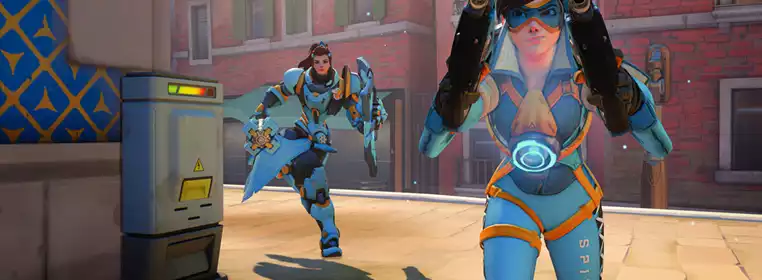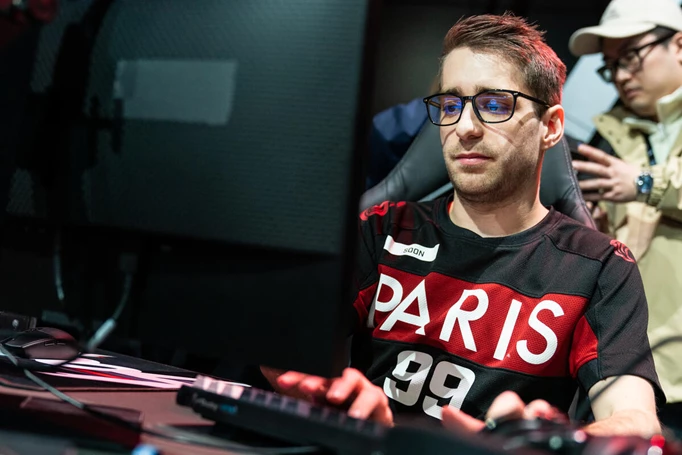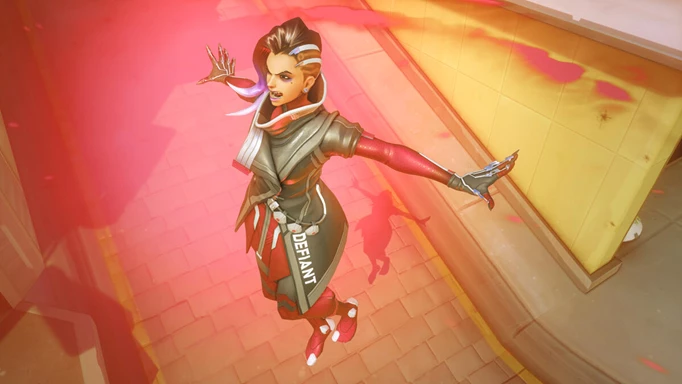The Good, The Bad, The Questionable? – Steel Series Invitational

The Steel Series Invitational that wrapped up this past weekend, marked the first-time fans were treated to seeing western Overwatch League teams play, since the Valiant Winter Ball last year. It was the debut of three entirely new rosters for the Boston Uprising, Paris Eternal, and London Spitfire, and a second appearance for the LA Gladiator’s newest squad as well. After two matches that went to map five and a convincing 3-0 in the finals, suffice it to say, the Steel Series Invitational was fun, refreshing, and a great dose of Overwatch to anyone looking for a fix in this dreadfully long off-season.
There was mayhem, outstanding individual performances, and generally exciting Overwatch coming from each series, and every match was an entertaining observation on how these teams match up against one another at the moment. Good highs and some sloppy lows, here are some of the good, bad, and questionable moments and performances from the Steel Series Invitational.

 Click to enlarge
Click to enlargeTHE GOOD - The Return Of The King(s)
Perhaps the biggest highlight of the tournament was the prevalence of Tracer and McCree in the meta, and with it, a feast of excellent hitscan play from some of the scene’s best. Eternal’s Samir "Tsuna" Ikram, Boston’s Terence "SoOn" Tarlier, and London’s Johannes "Shax" Nielsen showcased their stellar Tracers, a visual treat that should always excite. While they didn’t play the hero for too long or outside of Control much, just seeing them play their signature time travelling ace pilot and absolutely farm on them was more than enough.
On the other side, you had hitscan specialists getting to step in on McCree and be the absolute different makers for their squads. Boston’s Jin-ui "im37" Hong, Eternal’s Stefan "Onigod" Fiskerstrand, and Ji-hyeok "birdring" Kim all had stellar performances on the hero. For birdring specifically, it really felt like a return to form, way back to his peak in 2018. We saw glimpses of that birdring back in the final moments of the Gladiator’s season last year, but in this tournament, birdring was tearing it up on the McCree. That type of play is more than enough to get anyone excited for a match and for the upcoming season.
Really Great Overwatch (for the most part)
Every team at the tournament played well, which is a testament to the talent this season, and hopefully shows that there will be less “bad” teams this year. In previous years, you have a lot of bottom of the barrel teams. They get farmed by even mid-table rosters and struggle to beat other weaker teams in their tiers in “toilet bowl” matches.
Now, things look a lot more interesting, teams are going to play it close, and maybe now the Overwatch League can have more of those major upsets every once and a while, more fluidity to the standings. The top teams will still be the top, and it seems only the Gladiators firing on all cylinders look like they can reach that level. Speculation aside, these teams debuted with really promising pieces, and there’s a lot of optimism to be had as to how they’ll perform this upcoming year.
Match MVPs
There were a lot of great moments from all four teams this tournament, but in the three matches, there were some very clear standouts as to who are the top performers for the winning squads. Here would be the unofficial match MVPs for each series.
Paris vs. Boston - Byeong-ju "Valentine" Kim
A WGS Phoenix alum, and most recent Korean Contenders champ, Valentine came in with a good amount of expectations to be a dire upgrade to the damage line of Boston. Suffice to say, in their series against Paris, with was his explosive Echo play and “fragadocious” mechanics, those expectations were met that helped place the Uprising in the finals against the Gladiators. Even having the gall to bust out Genji into a McCree, Mei, and Baptiste brawl composition, Valentine proved he was a player of a pretty high mechanical power, with the swagger and confidence of a potential star.
Gladiators vs. London - Young-hun "MuZe" Kim
Another WGS Phoenix alum and most recent Korean Contenders champ, MuZe is another player who has big expectations for this season. Often hailed as the best (if not one of the best) main tanks from the most recent Contenders season, MuZe had to provide the frontline star power performances that the Gladiators have historically lacked sometimes. In this match, MuZe was that difference-maker, the necessary playmaker to clinch the victory for the Glads. His Winston was great, and his Reinhardt performed tremendously in the Rein duels, especially in the final map on Lijang Tower. He’ll be a very key piece to the Gladiator’s potential success this year.
Gladiators vs. Boston - Jin-seo "Shu" Kim
Quite simply, Shu is a good player. In fact, he’s a great player; he’s actually one of the best support players we have in Overwatch right now! After two years playing for Guangzhou, Shu has become a part of this supposed superstar roster the Glads have been forming. This is supposed to be their actual year to be title contenders, and Shu is supposed to be a key piece in that plan. Why? Well, because Shu is disgusting, and this match was the biggest showcase by far as to how the Gladiators could potentially have one of the best support lines in the league.
His Baptiste was crisp, his Ana was clutch, and he even gave viewers great Zen play for the five minutes he had the hero locked in. Seriously, Shu’s Amp Matrix / Firestrike combos probably won the Gladiators more team fights than you could count on both hands, and his Ana was able to completely shut down individual plays or rotations with sleeps and ‘nades. Shu was absolutely the biggest factor as to why Boston could never gain a foothold in that final series.

 Click to enlarge
Click to enlargeTHE BAD – Sombra Nightmares
Every team had a lot of things to brush up on and learn from this tournament. Which is fine; it’s the pre-season, and teams are still figuring out the best ways to play in a meta that probably won’t be the same by the time the season starts. The Gladiators weren't as dominant as maybe people would've liked; Boston needs to figure out how to run the best comps in certain situations, Paris could use some refinement in synergy, and London needs to hit the drawing board on their ability to perform on control. There was nothing that really stood out from any of the teams besides one thing, the Sombra play.
The Sombra play was no bueno, a lot of players dying with ult before the team fight, losing duels, and overall playing at levels from decent to sloppy. It raises the question of a potential Sombra meta, and whether or not the teams have the right players for the hero when the need arises. It isn’t a big concern, as it is with a lot of things in this tournament, but it was most certainly the weakest aspect of the strategy coming out from what was seen throughout the day.
THE QUESTIONABLE – The meta was good, yes? Right?
Overwatch esports has been historically defined by metas throughout the year, mostly because they tend to stick around for very long. But 2020 saw the era of hero pools and the very frequent fluidity to what were the best heroes and compositions to play at the time. Now, the future is uncertain; who knows what the meta looks like come the start of the 2021 season, and if it’s what we saw at Steel Series, is that a good thing or a bad thing?
Well, the good thing was seeing a lot of Tracer, McCree, and Reinhardt, characters fans have historically enjoyed seeing, and players enjoyed playing. Nice Earthshatters, flank deadeyes, Tracer outplays, and even a little sprinkling of Ashe is nice to see.
The bad news is a return of the more visually dreadful double maintank / Symmetra brawl that plagued the Lijang Tower at the start of last year's season as well. That kind of composition makes watching Overwatch as messy as it's ever going to get, and really puts a hamper on the fun and exciting elements that usually make OW a joy to watch. Even more worrying is the return of the ice queen herself, Mei, and her uncomfortable grip on the flow and direction of team fights and ultimate usage through her Blizzard and Ice Wall. No one is ever going to clamour for more Mei (hopefully), and seeing her prominence puts a little bit of anxiety into the prospects of what we might see come April. Hopefully, there are balance changes that turn the tide of the meta by the time the league starts, and we'll get a more engaging and more viewer-friendly core group of heroes to watch.
While the games were fun, and there are lessons to be taken for the four teams, the results aren’t necessarily indicative of any large implications for this upcoming season. Teams playing it close is an incredibly exciting prospect, and something a lot of teams need to deliver on this upcoming season, performing and taking Ws when you should be able to and doing everything in your power to pull it off. There are a lot of things to take from this tournament and some to overlook, but overall it was a fun experience that gives a nice glimpse as to what kind of Overwatch we can see this upcoming season.
All images courtesy of Blizzard Entertainment